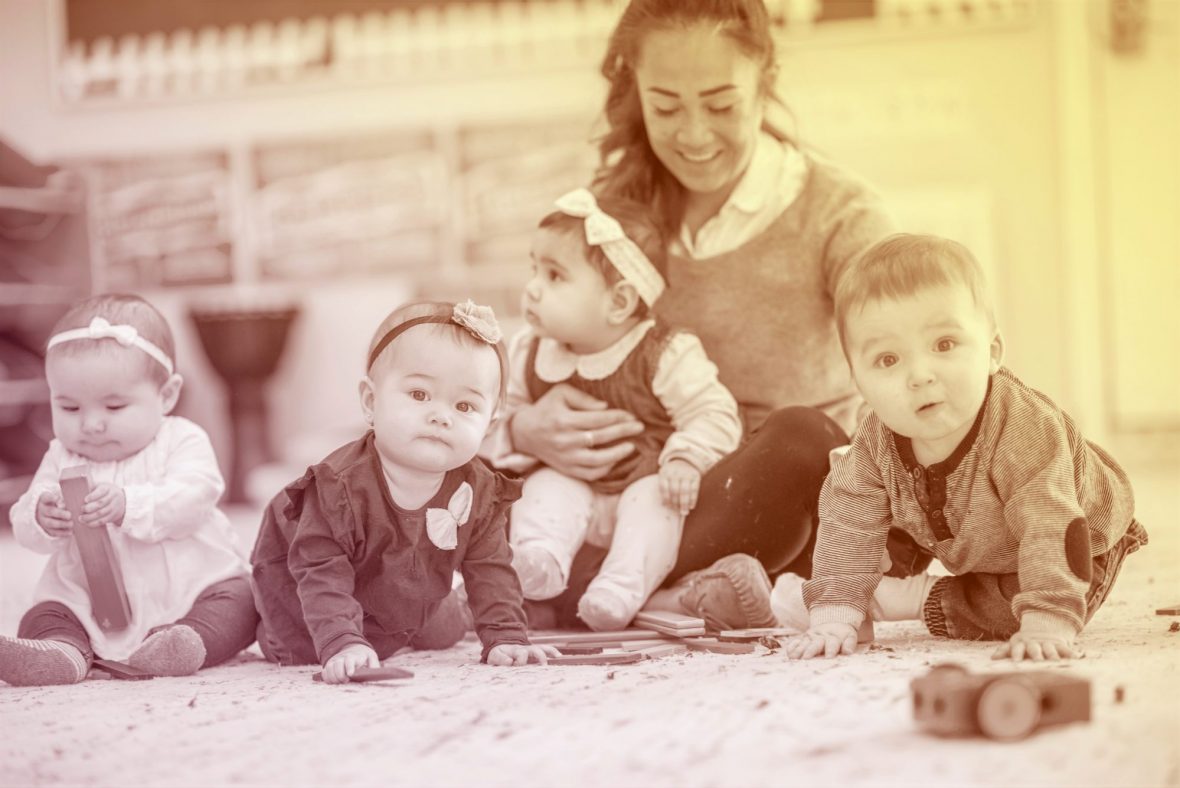Choosing the right daycare for your children is rarely an easy decision. Considering in-home daycare? Here’s everything you need to know.
By Tracy Collins Ortlieb Updated February 06, 2020
The thought of leaving your baby with someone else all day, every working day, is a daunting one—and a major family decision. But returning to a post-maternity 9-to-5 is the norm: Among married couples, two-thirds of moms work outside the home, as do nearly 75 percent of unmarried mothers.
From nannies to au pairs to daycare centers to deeply involved grandparents, child care options are everywhere. But cost is also a major consideration: U.S. parents currently spend an average of 10 to 29 percent of their annual income on child care, per child. For many parents, cost is a deciding factor when considering home-based daycare. Typically more affordable than a daycare center or nanny share, home-based care offers an experience with licensed, trained caregivers in a homey environment where your little one will socialize with age-appropriate peers.
From the benefits and downsides—as well as questions to ask and what to look for—here’s a primer to deciding if in-home daycare is right for your family.
- RELATED: What Makes a Great Daycare
How Does In-Home Daycare Work?
Home-based daycare (also known as family child care) is a form of early childhood education in which a caregiver looks after children in their own home, frequently with the help of an assistant. As opposed to a larger daycare center, a child will be dropped off in a comfortable and familiar home environment.
While caregivers aren’t required to have formal training in early childhood education to open an in-home daycare, many are dedicated to developing programs based on different early educational philosophies. You can find home-based child care built around philosophies such as Montessori, Waldorf, and Reggio Emilia.
What are the Pros of In-Home Daycare?
Home-based child care is easier on a parent’s wallet. The average weekly in-home child care cost for one infant child is $199, according to a recent Care.com survey, versus $211 at a daycare center. A nanny, comparatively, costs parents an average of $596 weekly.
Another plus: smaller groups of children. While in-home facilities are typically limited to six children per teacher, the U.S. Office of Personnel Management recommends class sizes up to 12 for toddlers in daycare centers. “Lower teacher-child ratio can be beneficial,” says Katherine Glenn-Applegate, Ph.D., senior specialist for early learning and innovation at Action for Children, a local child care resource and referral agency in Central Ohio. “But the effect depends on the quality of those interactions. Assuming those warm, responsive interactions between caregiver and child, the lower ratio is ideal.”
In-home daycares also cater to a wider age group, which makes it easier for siblings to be together. “That is important for a sibling relationship, as well as convenient for families for pickup and drop-off,” says Dr. Glenn-Applegate.
There are also flexible child care hours that can accommodate a parent’s late meeting or need for weekend or overnight care. And typically there are only one or two teachers. “There’s continuity,” says Dr. Glenn-Applegate. “A child may well have the same teacher from infancy all the way to kindergarten.” Many in-home care operators or teachers, she adds, also speak a language other than English, like Spanish or Somali.
What Are the Cons of In-Home Daycare?
While anecdotes abound of in-home daycares operated by teacher parents who opted to stay home with their own children, Dr. Glenn-Applegate notes that in-home child care providers tend to have less education than those in daycare centers. “The teacher population is holistically less educated than in center-based child care,” she says.
Glenn-Applegate also notes that parents should be mindful of an in-home facility’s outdoor play space (or, if lacking, alternatives for daily exercise), and the fact that—unlike in a child care center—nearly every home has an exposed and accessible television.
- RELATED: Tips for Choosing a Good Nanny
“If this is the case, parents should always ask the operator how much screen time children will be exposed to,” says Glenn-Applegate, as well as discuss policies on restricting child access to television.
How to Choose an In-Home Daycare
Reputable in-home daycare programs are licensed to operate on a state-by-state basis and will have to pass an inspection process to ensure their home is safe for children. Parents should confirm the license is up-to-date and that the facility is following state guidelines.
Most states also offer a searchable database of licensed in-home child care facilities, and local nonprofit child care-focused agencies also assist parents in finding a match for their in-home care needs. Nonetheless, Dr. Glenn-Applegate notes that personal recommendations will typically trump a web search.
“There’s a lot of word of mouth in in-home care,” she notes. “There is an enormous community of parents and family child care providers that serve as an informal network; if one desired facility is full, the operator might recommend another. Word of mouth is also how parents can believe a referral to be trustworthy: ‘My sister sent her kids there,’ or ‘My neighbor sent her kids there and loved it.’”
- RELATED: The Child Care Crisis
Parents should also confirm that a desired facility is adhering to “safe sleeping” regulations. According to Holly Flanders, founder of Choice Parenting, a New York metro area-based consultancy firm that aids families in finding child care solutions, each state has different ratios for safe sleeping numbers, ensuring infants have access to a safe crib “and not be nodding off in a chair or bouncy or swing.”
Equally important are the facility’s policies toward caregiver emergencies. At a larger daycare center, staff members who fall ill or otherwise require time off function within a pool of other caregivers able to step into the classroom on short notice. Parents should clarify how the home-based care responds to such emergencies and the timeline in which parents are notified. “Are they going to have proper ratios and proper coverage in the classroom?” asks Flanders. “Will the caregivers coming in to substitute for the day know the children and know their routines and the facility’s rules and policies? These are all things to be looking for.”
Flanders also recommends securing relevant background information on all caregivers and having a conversation about their philosophies in terms of child care. “As a mom I have certain philosophies and things I know I shouldn’t do,” she says. “In a professional environment that’s naturally very chaotic and where children are always going to be needy and need an adult to be an adult, I’d want to know about the caregivers’ background and strategies for handling those kinds of stressors.”
Always Keep Tabs On In-Home Daycare
After you’ve decided on a home-based daycare, Glenn-Applegate urges parents to regularly assess whether the facility is working within the family’s lifestyle and means.
“Are pickup and drop-off convenient? Does the care meet your budget, or is it an unnecessary strain on your budget?” she asks. And pay attention to whether or not your child is happy and enthusiastic to go every day because that can be a big indicator about their feelings about the daycare.
Experts also recommend keeping the lines of communication open: Initiate discussions with caregivers about your child’s activities and moods, when and what they’ve eaten, and any anomalies in bodily functions or temperament.
“No matter your child care choice, I’m also a big fan of just dropping in,” says Flanders. “Whether your child overslept or had a doctor’s appointment, there will always be an opportunity for it and to ‘catch’ your caregivers administering their standard quality of care. The best in-home care will have an open-door policy for you and your family.”
Featured at Parents.com




